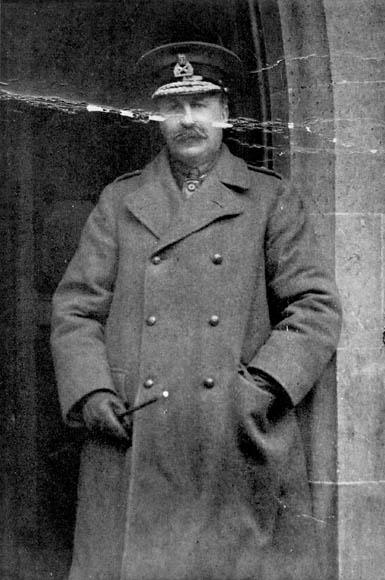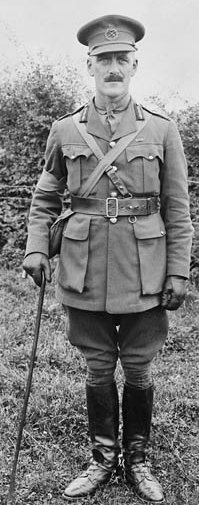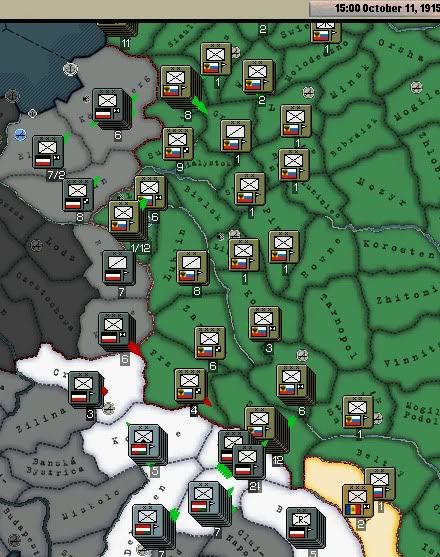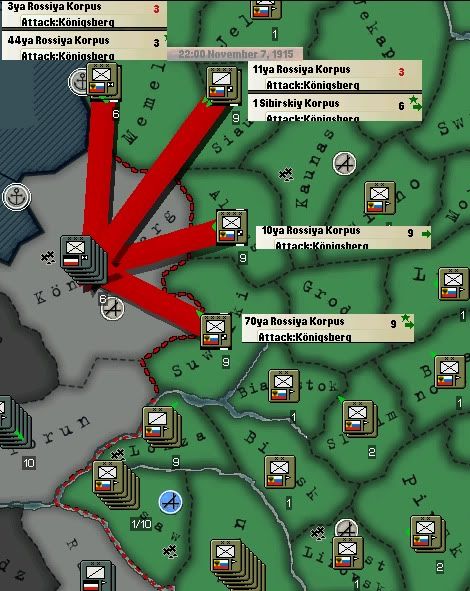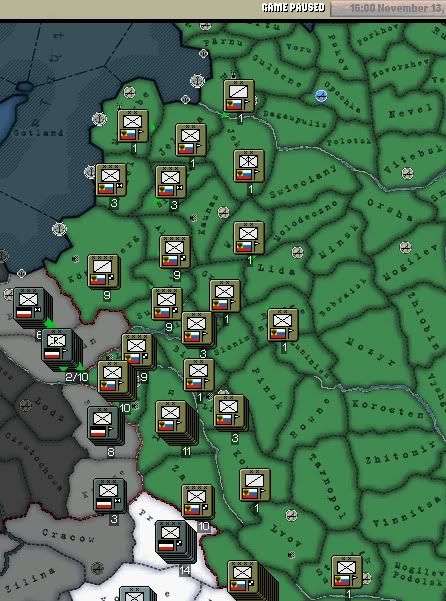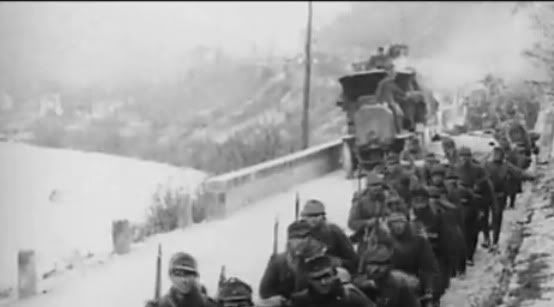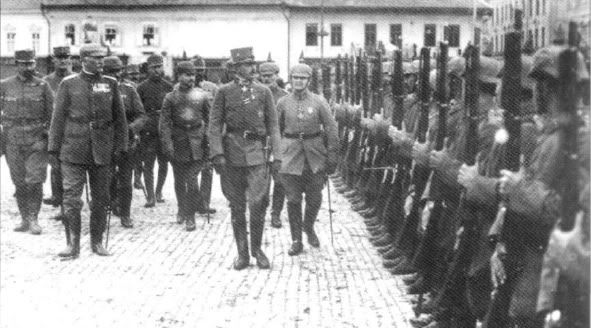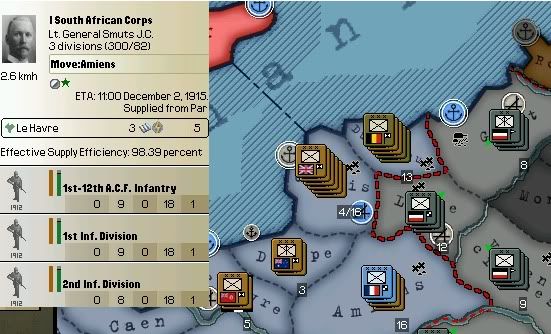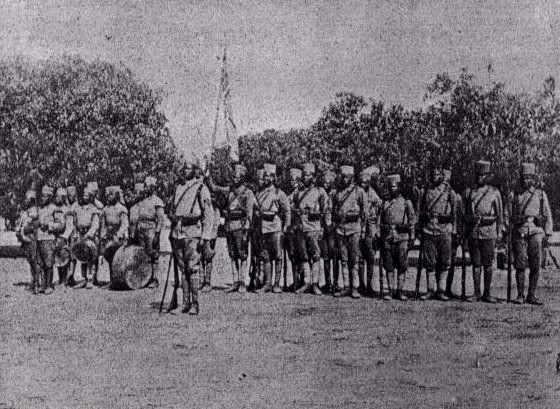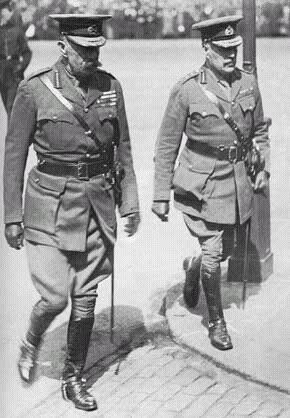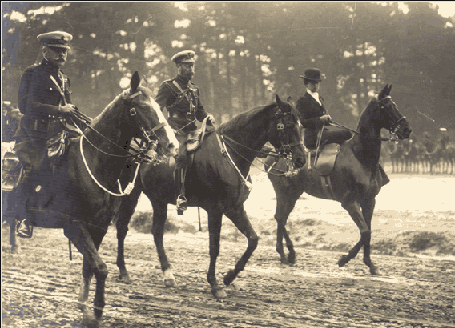Chapter twenty-nine: Black October.
October 1915 almost became a black month for Herbert Asquith. It began with the bickering caused by the Alderson-Hughes feud, which was greatly (if unwantedly) helped by the Germans, which attacked the recently arrived Canadians and made use of chemical weapons. In fact, the French had been the first to employ gas - tear gas (ethyl bromoacetate) actually- in August 1914, in such small quantities that were not even detected by the Germans, a problem which was suffered later on by the Germans when they attacked the British position at Neuve Chappelle in October 1914. Germany was the first to make large-scale use of gas as a weapon when on 31 January 1915, 18,000 artillery shells containing liquid xylyl bromide tear gas were fired on Russian positions on the Rawka River, west of Warsaw, but, instead of vaporizing, the chemical froze and failed to have the desired effect.
Finally, on September 28, 1915 (1), a gray-green cloud drifted across positions held by French Colonial troops who defended a sector north of Ypres. The Colonials fled in pain and panic, abandoning their trenches and creating an 7 km gap in the Allied line. However, the German infantry of the Albrecht, Duke of Württemberg's 4. Armee was also wary of the gas and failed to exploit the break before the First Canadian Division and some French troops reformed the line in scattered, hastily prepared positions 2 km apart. Two days later the Germans used gas again, September 30, against the 1st Canadian Division; again on October 2, near Mouse Trap Farm, and on October 5 against the British at Hill 60. However, the front resisted the German onslaught, although the Canadian Corps suffered over 50% casualties, nearly 6,000 men, in the so-called Second Battle of Ypres (September 28-October 30, 1915).
Lieutenant General Sir Edwin Alfred Hervey Alderson, KCB (1859 – 1927)
For Alderson the battle meant his end. Although his troops had held, he had found himself out of touch with the front line and unable to get accurate information about the situation. In addition to his personal failures, the Ross rifles had proven almost useless (2) in battle and Alderson's officer corps had performed poorly, in particular Brigadier-General Garnet Burk Hughes, Sam Hughes' son. Carson however, who reported personally to Hughes, downplayed the difficulties and blamed the heavy casualties on Alderson's leadership, indicating that the Corps had only been saved from annihilation by the actions of Richard Turner and Garnet Hughes. Such a preposterous comment was to have 'funny' consequences later on.
However, Hughes was also in deep trouble, as the Ross Rifle had proved to be useless in the filthy conditions of the trenches and its incompatibility with the British Lee Enfield rifle meant that the Canadian troops were continually running out of ammunition. Finally, a compromise was reached. Through the mediation of Asquith and General French, Alderson was transferred to the nominal post of Inspector-General of Canadian Forces and Sir Arthur Currie replaced him in command of the Canadian Corps. In exchange, the Canadian soldiers finally got rid of the Ross rifle and were reissued with Lee Enfields. However, there was still the problem of Major General Garnet Hughes, who, with Turner, had panicked during the chaos and sent erroneous messages back to divisional headquarters that their line had been broken and was in full retreat, when in fact their Brigade had not even been attacked yet. Furthermore, Hughes disobeyed orders and, instead of filling the holes in the Allied line, and sent the soldiers on a night-time attack against a German strongpoint at Kitcheners' Wood, which ended in disaster and caused 75% casualties to the attackers.
Thus Sam Hughes found himself in the amusing situation of having cheered his son as a heroe when, suddenly, everything seem to point that Garnet Hughes was going to be court-martialled for cowardice and incompetence. In the end, a compromise was reached and Hughes was assigned to an obscure administrative post in England (3). Back at home, Sam Hughes was to enter into a fast decline which would led to his replacement by Sir Albert Edward Kemp, KCMG, PC, by early 1916. In addition to the Ross fiasco, among the many "sucesses" of Hughes are sending Anglocentrics to recruit French Canadians, and by forcing French volunteers to speak English in training, which, it goes without saying, made him "hugely" popular among the French Canadians. All this mess made him worthy to be knighted as a Knight Commander of the Order of the Bath, on August 24, 1916 (4).
Major General Garnet Burk Hughes CB, DSO (1880 - 1937)
Meanwhile, on the Eastern Front...
Hardly had the Alderson-Hughes feud had finished when the Austro-Germans attacked in the Eastern front with the aim to recover Przemysl. After a heavy artillery bombardment, the combined armies of the Central Powers launched an attack which caught the Russians by surprise (5). The Central Powers shattered the Russian defenses, and the Czarist lines collapsed. Soon, the Russian armies, under General Nikolai Ruzsky, in the whole Southern front were retreating. Only the conquest of Memel by General Plehve avoided the situation of becoming a total disaster, as it forced the Germans to shift troops from the South to Prussia. Thus, to alleviate this dangerous situation, the STAVKA decided, after receiving some Allied suggestions (6) to attack Köningsberg with the combined force of six armies -400,000 men with 350 guns.
In the late hours of November 7, 1915, the Czarist onslaught began. The attack was a complete succces and, after a week of vicious fighting and gruelling marches, the Russian troops conquered Köningsberg, dealing a mortal blow to the Prussian moral. However, the October battles had costed the Russian army one million casualties (killed, injured and POWs included) and heavy losses in equipment. The Central Powers had suffered less badly, 750,000. However, the Austrian Empire was showing the first troubles to find recruits and replacements for the casualties (7).
The Eastern Front after the battles of October.
Austrian troops advancing towards Przemysl.
In was then, when October couldn't look worse for Asquith, a glimpose of hope appeared for him when the simultaneous Allied offensive in Middle East began.
Crown Prince Charles of Austria-Hungary inspecting a German guard of honour.
(1) The butterfly effect strikes back, as the OTL attack took place in April that same year.
(2) So to speak, the Ross was the SA80 of WW1: a fine weapon on a firing range under controlled conditions, but almost useless in the battlefield.
(3) He spent the rest of his life seeking revenge by attacking Currie's reputation through scurrilous editorials published in newspapers owned by his family.
(4) In case you have noticed yet, I can't stand the Hughes -both father and son- and I have "accelerated" daddy's fall -which tooke place in November 1916. I'm afraid that I couldn't stand the idea of having him for so long in the war.
(5) Really? You, Iwan, and Fritz have been using the same tactic since the beginning of the war and you're telling me that they got you by surprise? How came? Did they were flying posters saying "this is not an attack"?
(6) Hi, this is the "Allied suggestion" speaking. Dirty, disgusting trick, but, hey, it was that or dying of sheer shame.
(7) That's the IA's fault, which spams thousands of divisions.
@quaazi: Me too. It's a pity to see the German navy going down in such a way. Let's hope that they remain in harbour and I won't have to sinke them all. About the subs... well... were not for the events, I wouldn't notice them.
@Enewald


@El Pip: It would have been a shame to leave them out of the war. About the guns... well... it was part of a conceited effort by the MI6 to fool da Krautz. Apparently, ze Germanz had the same idea at the same time...

@quaazi: So, do you see the tragic of this war? I'm figthing in the wrong side! Darned Billy!!!!
@FlyingDutchie: Yes. Danke Gott ze Fritzies have not to cross a channel to reach Paris...
@Nathan Madie: Let's hope that French, Haig or Joffre doesn't get wind of your plan...
@Alexus: Good old Blackie!
@Nathan Madien (2): Really?
@Tigey: Well, without the German surface fleet it would be quite simple to prepare the Baltic Scheme and to land in Northern Germany. I guess that in the present reduced form they won't present any trouble for such an operation. But I'm afraid you're right and that perhaps Kaiser Bill is going to being spamming Uboaten by the thousands...
And now...
For most conspicuous bravery during recent postifications, Mr Enewald and Mr El Pip have displayed the greatest gallantry and witticism and utterly regardless of danger, both went ahead and shot where it most hurt, that is, in the humour sense of the enemy, that is, the AARtist

Thus, their heroism is not going to go unpunish... erm..., ignored, and by the powers that the Holy Pizza has given me, I shall award and I award them with the
Petinguished Order of the Sacred Holypizza (POSH).
Congratulations, gentlemen!


